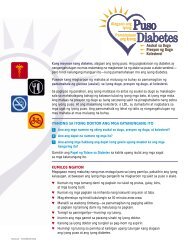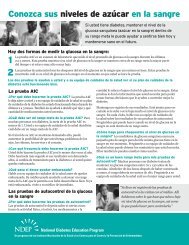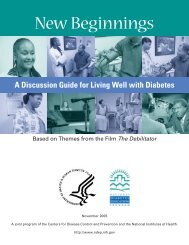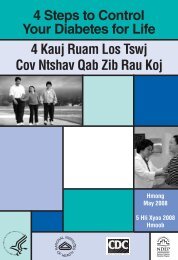Power to Prevent - National Diabetes Education Program - National ...
Power to Prevent - National Diabetes Education Program - National ...
Power to Prevent - National Diabetes Education Program - National ...
Create successful ePaper yourself
Turn your PDF publications into a flip-book with our unique Google optimized e-Paper software.
Learning <strong>to</strong> Relax<br />
There are many ways <strong>to</strong> help yourself relax:<br />
Breathing exercises. Sit or lie down and uncross your legs and arms. Take in a deep breath.<br />
Then push out as much air as you can. Breathe in and out again, this time consciously relaxing<br />
your muscles while breathing out. Keep breathing and relaxing for 5 minutes at a time. Do the<br />
breathing exercises at least once a day.<br />
Progressive relaxation therapy. In this technique, which you can learn in a clinic or from an<br />
audiotape, you tense muscles, then relax them.<br />
Physical activity. Even limited activity such as stretching can be relaxing. Moderate intensity<br />
activity such as walking has many benefts, including relieving stress and depression.<br />
Replacing bad thoughts with good ones. Each time you notice a bad thought, purposefully think<br />
of something that makes you happy or proud. Or memorize a poem, prayer, or quote and use it<br />
<strong>to</strong> replace a bad thought. Remember the saying of the Little Engine That Could? Replace “I can’t<br />
do it” thoughts with “I think I can, I think I can” and you will succeed!<br />
Whatever method you choose <strong>to</strong> relax, practice it. Just as it takes weeks or months of practice <strong>to</strong><br />
learn a new sport, it takes practice <strong>to</strong> learn relaxation.<br />
Other Ways <strong>to</strong> Reduce Mental Stress<br />
Ask yourself, can I change something in my life <strong>to</strong> lessen stress? If you feel that you just don’t have<br />
time <strong>to</strong> take care of yourself because you are <strong>to</strong>o busy taking care of others, is there someone you<br />
can ask <strong>to</strong> help? Can you share child care with a friend? Can you get your teenagers <strong>to</strong> help with<br />
chores <strong>to</strong> reduce your stress about getting everything done?<br />
Some sources of stress can’t be eliminated, but you can still learn <strong>to</strong> deal with them. There are ways<br />
<strong>to</strong> reduce the stresses of living with diabetes. Support groups can help. By talking <strong>to</strong> other people<br />
in the same situation, you can pick up tips for living with diabetes and coping with stress, and you<br />
know that you are not alone.<br />
There are other ways <strong>to</strong> fght stress as well. Add positive things that ft in with your life: confde in<br />
friends, play with your children and grandchildren, consider prayer and meditation, or walk more.<br />
Physical activity itself can lift your spirits and reduce stress.<br />
Dealing directly with diabetes-related stress can also help. Think about the aspects of living with<br />
diabetes that are the most stressful for you—taking your medication, checking your blood glucose<br />
levels regularly, exercising, or eating as you should. What can you do <strong>to</strong> change these stressors?<br />
Can you fnd a way <strong>to</strong> make these stressors easier <strong>to</strong> accept?<br />
Sometimes stress can be so severe that you feel overwhelmed. Counseling or psychotherapy might<br />
help. Talk <strong>to</strong> your health care provider about your options for how <strong>to</strong> deal with your stress. You<br />
may learn new ways of changing your behavior.<br />
NDEP <strong>Power</strong> <strong>to</strong> <strong>Prevent</strong> Appendices 94













